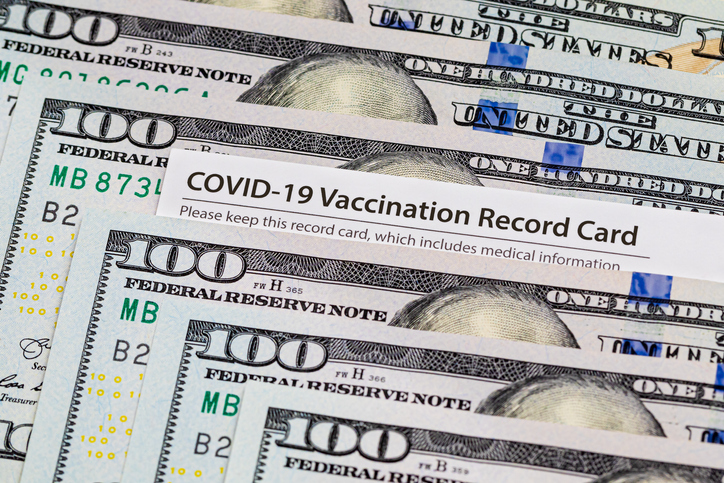President Biden announced in August further steps the government was taking to get more people vaccinated to stay ahead of the COVID-19 virus, including a mandate for all long-term care workers who serve Medicare and Medicaid enrollees to be vaccinated.
According to Biden, the Department of Health & Human Services (HHS) will develop new regulations requiring nursing homes to require all of their workers to be fully vaccinated against COVID-19 as a condition of participating in the Medicare and Medicaid programs.
These new rules would affect nearly 15,000 nursing home facilities, which employ approximately 1.6 million workers and serve approximately 1.3 million nursing home residents.
While it’s inarguable that the elderly are most at risk to succumb to the virus, health care workers are among the largest community to reject the notion of getting vaccinated. According to a report from AARP, some 45 percent of staff in the nation’s nursing homes and long-term care facilities were unvaccinated as of March 2021.
Many health care workers are of working age and have more than a 98 percent chance of surviving COVID-19. They may have religious or antithetical reasons for declining the vaccine or feel there are adequate early treatment options for the disease. Additionally, the federal health agencies have given mixed messages on whether the vaccines will stop someone from transmitting the virus.
By telling the unvaccinated workers to get the shot, the Biden administration hopes to give them the final impetus to take the vaccine. Some don’t think this will be enough, and rather than knuckle under to a coercive administration that would tie nursing home workers’ jobs to getting a vaccine they do not want, a likely outcome is they will not return to work at all, creating a shortage of workers in this sector of health care, thus resulting in less care for the infirmed elderly.
Path to More Government Coercion
The administration’s latest policy aimed at nursing home staff could set a bad precedent for further intrusion into economic activity, public and private, tied to the federal government, says Norman Singleton, vice president for policy at Campaign for Liberty.
For instance, if the government can force nursing home staff to receive vaccines on the grounds that their employer receives federal funds, why can’t it require any institution that receives federal funding–including colleges and K-12 schools–impose vaccine mandates on both their employees and their “customers,” Singleton asks.
“In fact, why can’t the federal government tell states they cannot receive federal transportation funds unless they refuse to issue driver’s licenses to anyone who does not show proof of vaccination,” Singleton said.
“The idea that government can force someone to receive medical treatment against their will constricts the ideas underlying a free society,” he said. “If government can force or manipulate you–with money taken from you via taxes– to getting medical treatment you would otherwise refuse, what can’t the government compel you to do?”
Big Government as Boss
The federal government is no stranger to using sticks to whip private entities into submission, says Marilyn Singleton, M.D., J.D., and expert on elderly health care protection.
In 2017, the Centers for Medicare and Medicaid Services (CMS) instituted a program that linked physician payments to its definition of “value” of the care patients received, says Singleton. But it is unfair to withhold funds from the already short-staffed institutions that are merely trying to care for their residents.
“It is laudable that someone in the government is taking note that nursing home residents are the most vulnerable to a severe case of Covid-19. The risk-benefit analysis weighs in favor of the residents receiving the vaccine,” Singleton said. “The CDC advises that current vaccines help protect the vaccinated person from severe disease and death.”
The manufacturers do not claim that the vaccines fully prevent infections or block transmission of the SARS-CoV-2 virus to others, she says. Additionally, data is showing that the current vaccines offer only modest protection against the Delta variant that is making its way around the world.
Another Power Grab
Besides religious objections and concerns about the side-effects of getting the COVID vaccine, there is another reason some people might not want to get vaccinated, says Linda Gorman, the director of health care policy for The Independence Institute.
“If you’ve already had COVID, why get vaccinated?” Gorman said in comments in an email discussion among health care reformers and which she shared with Health Care News.
“Current evidence suggests that reinfection rates are rare, less than 1 percent, and resultant disease is mild,” she wrote. “Large numbers of people have presumably had COVID and know they have had it. They have immunity. They have not generated any records in the medical system because there is no point in seeking testing or medical care unless one is having serious health issues.”
A number of people question the safety and effectiveness of vaccines, pointed out Gorman.
“Given the shameless politicization of the COVID epidemic and the shambolic public relations campaigns coming out of the public health and other establishments, there are significant numbers of reasonable people out there who have stopped believing anything the news or the government says,” wrote Gorman. “
“Ratcheting up the vaccine requirement by making it a job requirement is simply seen as another power grab,” Gorman said. “Reasonable people figure vaccines that really work protect those who get them from those who have the disease. As Florida Gov. DeSantis said, ‘If you get a vaccine, the vaccines are effective, you’re immune, and so act immune.”
Kenneth Artz (KApublishing@gmx.com) writes from Dallas, Texas.
